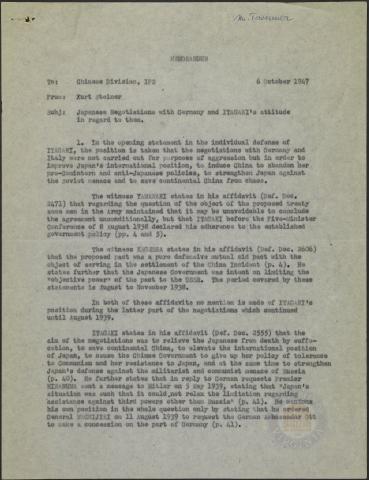
Page 1
| Parent | Japanese Negotiations with Germany and ITAGAKI's attitude in regard to them |
|---|---|
| Date | 6 October 1946 |
| Language | English |
| Collection | Tavenner Papers & IMTFE Official Records |
| Box | Box 3 |
| Folder | General Reports and Memoranda October 1946 |
| Repository | University of Virginia Law Library |
MEMORANDUM
To: Chinese Division, IPS
From : Kurt Steiner
Subj: Japanese Negotiations with Germany and ITAGAKI’s attitude in regard to them.
1. In the opening statement in the individual defense of ITAGAKI, the position is taken that the negotiations with Germany and Italy were not carried out for purposes of aggression but in order to improve Japan’s international position, to induce China to abandon her pro-Comintern and anti-Japanese policies, to strengthen Japan against the Soviet menace and to save continental China from chaos.
The witness YAMAWAKI states in his affidavit (Def. Doc. 2471) that regarding the question of the object of the proposed treaty some men in the Army maintained that it may be unavoidable to conclude the agreement unconditionally, but that ITAGAKI before the Five-Minister Conference of 8 August 1938 declared his adherence to the established government policy (pp. 4 and 5).
The witness KAGESSA states in his affidavit (Def. Doc. 2606) that the proposed pact was a pure defensive mutual aid pact with the object of serving in the settlement of the China Incident (p. 4). He states further that the Japanese Government was intent on limiting the “objective power” of the pact to the USSR. The period covered by these statements is August to November 1938.
In both of these affidavits no mention is made of ITAGAKI’s position during the latter part of the negotiations which continued until August 1939.
ITAGAKI states in his affidavit (Def. Doc. 2555) that the aim of the negotiations was to relieve the Japanese from death by suffocation, to save continental China, to el3evate the international position of Japan, to cause the Chinese Government to give up her policy of tolerance to Communism and her resistance to Japan, and at the same time to strengthen Japan’s defense against the militarist and communist menace of Russia (p. 40). He further states that in reply to German requests Premier HIRANUMA sent a message to Hitler on 5 May 1939, stating that “Japan’s situation was such that it could not relax the limitation regarding assistance against third powers other than Russia” (p. 41). He mentions his own position in the whole question only by stating that he ordered General MACHIJIRI on 11 August 1939 to request the German Ambassador Ott to make a concession on the party of Germany (p. 41).
